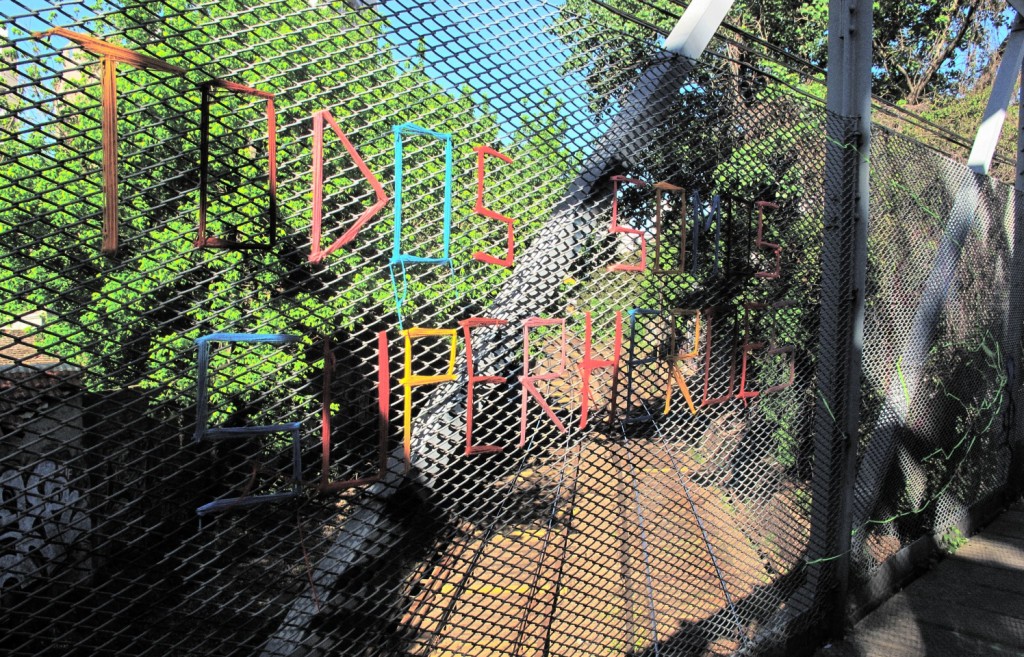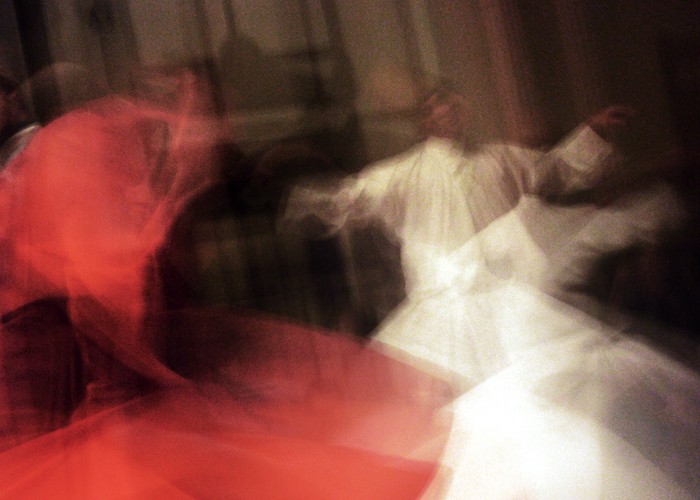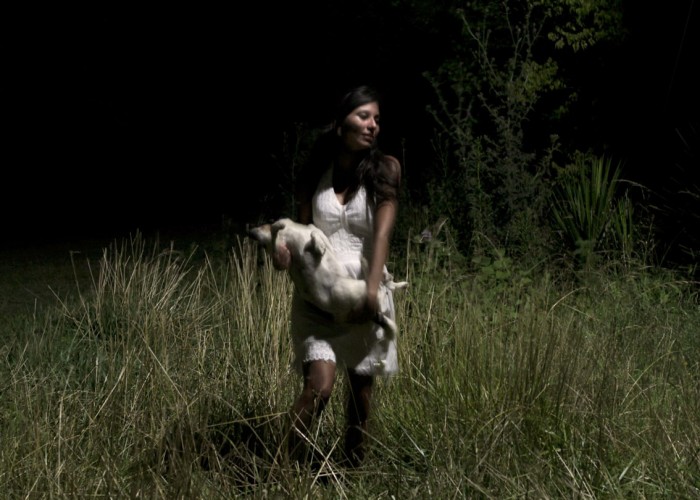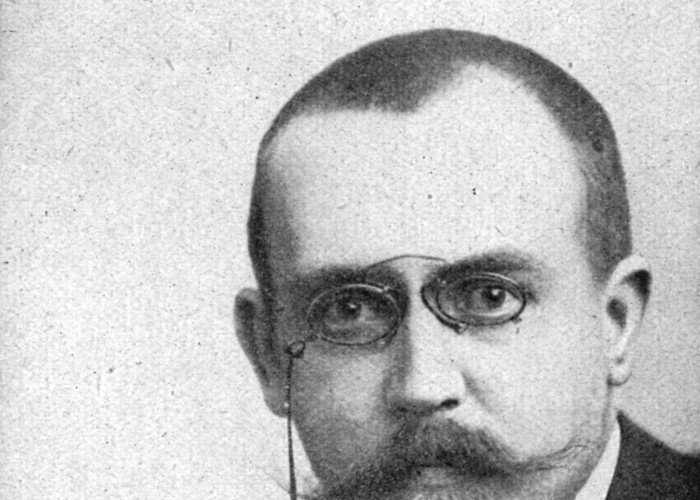from The Sofa Sages
 Eitán Futuro
Eitán Futuro
translated by Jennifer Croft
[an excerpt]
Lara began to kiss me. I hadn’t kissed her first because I thought you couldn’t kiss them on the mouth. I touched her breasts over her bra and lay down on the bed. They were fine. Mariela had had hers done last year. The first time we were together—my first time—she didn’t let me take her t-shirt off. She said they were too small, and if I saw them I wasn’t going to want to be with her anymore. She also didn’t want me to take off my t-shirt. She said I was really thin, and that it freaked her out. She didn’t even take her tights all the way off. She got this idea in her head that if I wanted it so bad, I ought to have to tear through her tights with my teeth. So for my first time there was no physical contact. Just latex, nylon, and cotton all rubbing up against one another.
For six months we had a secret relationship. Tumbi, who was friends with both of us, was in love with her, and they would have these endless talks on Mariela’s balcony while I would play the piano in the living room. At the bus stop for the 29, Tumbi would go on and on and on to me about it, and I couldn’t tell him what I thought about his conflict because that would have meant breaking my vow of silence that I had with Mariela. My dad taught me two things when I was five, and I asked him if I could start karate: never hit somebody when their back is turned, and a person’s word is sacred. He’d known I’d listen because I wanted to be a ninja, so he combined one of the rules he had learned from his Okinawa master when he was doing karate at the JCC with a more conventional disciplinary technique.
Then came the horror of our graduation trip, that scene against the backdrop of Nahuel Huapi Lake, with the ORT Music Production Class of 2003 in the foreground doing our dance of assisted sterile mating, in most of the cases symbolic, emotional masturbation en masse, a bukkake to Hebrew heaven for the relinquishing of intelligence. Do you have to get drunk and let your girlfriends get seduced by the trip coordinators dreaming in strobe lights? Totally cool, Mati! Whatever floats your boat, Yoni, we’ll wait here at the base of the Tronador because it turned out when we came to Ski Day that we hadn’t actually paid to go up the mountain. The contract said very clearly that they would take us to the base to do cross-country skiing, no, they’re not assholes, you’re right, Mati, if we had wanted to ski like just kind of striking out instead of skidding around horizontally like newborn ducklings, throwing snowballs at each other saying “the snow is so pretty, I want to live in the snow,” and later we’d be told how it is pretty, although it’s prettier up there where it doesn’t form a solid base, where it swirls around like sugar in the cotton candy machines they have at the zoo and gets into your nose all frisky so that you have to try and get it out with your big black glove, so that you end up undoing the Velcro and you feel how that nakedness of your hand in the snow at those heights burns, too—if we had wanted the complete experience, we should have asked our parents to spring for the complete package, and it’s a shame about our parents, and a shame about us.
Wolo had awoken at seven in the morning and had gone down the two blocks to the lake in his brown leather jacket over four white cotton t-shirts, one after another—the warmest thing you can do is multiple layers of cotton—and he’d cleared a space in the pebbles and sat down to read random pages of The Antichrist, which had highlighting in it in two different greens, the lighter one for important sentences and the darker one for important words in important sentences; concepts he didn’t understand or that he wanted to investigate further were marked in blue. He came back to the room at eleven and woke me up with the smell of the fart he let out while he was unzipping his jacket. Wolo was sleeping in the normal bed, and I had thrown a mattress on the floor after some long soul-searching: the bed I’d gotten stuck with (the coin had landed heads) was two beds, one directly on top of the other, a bunk bed, and if I took the top bunk I risked falling out the first time I moved in my sleep, and if I took the bottom one I risked the top one collapsing on top of me. “If there’s a problem here that can’t be solved,” Wolo’d said, “it’s that you’re a dumbass.” Wolo had been obsessed with Nietzsche since the beginning of senior year, and he was also obsessed with zoophilia. “There’s this website, whorse.com, that specializes in equestrian penetration,” he told me on one of our walks to the lake, “and I jerk off a little, like, hard, and then I feel bad. Why would I feel so bad about it?”
I sat up on my mattress and rubbed my ears.
“I was thinking,” he said. “I’m not going to go to the chocolate factory.”
“Me neither,” I said.
The trip to the chocolate factory was so that we could buy gifts for our families.
Wolo believed in micro-resistance, saying no to the free drink they’d offer you at clubs, not going on outings whose only purpose was consumption. We still had Ski Day left, and our last night at Grisú, this labyrinthine club that was supposed to look like a coalmine. Each of the three days we had been there, each time it was almost time to go somewhere all together, and the rest of the class went to the punks from Flores’ room to smoke pot, me and Wolo would go to the lake. We were becoming friends.
Seen from behind as we crossed San Martín Avenue going towards Nahuel Huapi Lake, we must have looked like we were the same height. Wolo was a few inches taller than me, although I had an afro that made me taller. I was wearing a gigantic parka with fur around the neck that my dad had brought back from London in the early eighties and sandals with two pairs of socks, and Wolo’s hulking figure was zipped up in that brown leather jacket. Seen like that, from behind, we must have looked like father and son.
Wolo swept the stones aside with his foot, a circle for him, and a circle for me, and we sat down facing the lake. I told him the story of my relationship with Mariela, how she wanted it to be open for the duration of the trip, and how it all had to be kept secret because of the pact I’d made with Tumbi:
“We were on the corner at the Pasta Factory at lunch time, eating ravioli by the door like we did every Friday. That day the punks from Flores had left because they had a handball game, and the three of us got to talking, as always, about what we were going to do about what was happening. Tumbi and I were both in love with Mariela, and she didn’t want to choose between us, and there was no way we were going to get into a three-way relationship. “If I could make you guys into a single man,” she’d say, the little bastard. Tumbi was facing us, sitting more out on the sidewalk. He proposed a pact, according to which neither of us would be with Mariela, because the three of us were friends, and that was the most important thing. All three were in agreement.”
Wolo listened to my story looking out at the lake, seeking out with his right eye a ray of sunlight that was reflected in the undulation of the surface of the water. The line of light that got projected onto his face moved and changed its form like a benevolent scar.
“So you fucked him over,” he said, and rubbed his eye. Then after a while he said, “you know that Asian girl on the third floor?”
“What are you talking about?”
“She’s sick.”
I waited for him to develop this idea, but he didn’t develop it.
“Sick bad or sick good?” I asked him after a while.
“She turns me on. Asian girls in general, although I don’t know if I would actually be with one.”
I wasn’t really into Asian girls, although I did have a fondness for Japanese culture that I had inherited from my dad. “I am into Japanese girls,” I thought. “I think I just have this idea that Chinese people are vulgar and Japanese people are refined, and Koreans, you don’t really know what they are. Maybe instead of thinking of Asian girls as mostly Chinese, if I think of them as pretty much Japanese, I might start to be able to be into them.” I told Wolo.
“Why would Chinese girls be vulgar?” he said.
“No, not Chinese girls, no, Wolo, just Chineseness,” and I told him the story my dad had passed along to me when I had begun karate at the age of five, which he had heard from his Okinawa master when he was eighteen:
“Okinawa, before being invaded by the Satsuma clan of Japan in the seventeenth century, was called the Kingdom of Ryukyu.
“In the Kingdom of Ryukyu, the master Zhang Chou Chung was born, lived, and made his name. He was a descendent of the Chung clan, banished from China by the Ming dynasty.
“Zhang Chou Chung developed the kung fu he’d learned from his father, blending it with the traditional dances done by the family’s servants in their free moments, and he named his creation Kempo.
“The Royal Kempo School opened for business in 1597. Zhang taught classes to any student from any caste, an act which won him disinheritation by his father, and he was banished by his banished family.’”
“There’s no such word as ‘disinheritation,’” Wolo interrupted me, clicking his tongue.
“How much you wanna bet? We can look it up,” I said.
“Did you bring a dictionary on this trip?” he said.
“Just a little Webster’s,” I said.
I’d also brought a purple notebook divided in half, where from the front cover to the middle I would write new words I was learning from the dictionary—I perceived a yawning lexical abyss on account of thinking about music all the time—and the part of the notebook that started on the back cover was for ideas for musical works. “Sounds that will follow the evolution of a tree branch” or “Mom is a basso continuo: cacophony as potential destabilizer.”
I returned to my story: Zhang Chou Chung had been disinherited for publicly teaching his kung fu mixed with Okinawa dances.
“In 1609, when the Satsuma clan from Japan was getting ready to invade Okinawa, and Zhang Chou Chung had reached the ripe old age of ninety four, the master summoned his close to two hundred disciples and formed an army to resist the attack.
“When his best disciple, Kurata ‘One-Eyed’ Ryu, asked the master who was going to be in charge of the army, just assuming the master was too old to fight, Zhang Chou Chung answered, ‘I will be in charge of the resistance: one hundred and ninety-nine men is too few, but two hundred should do the trick.’
“The six thousand men of the Satsuma clan of Japan, led by General Yoshuma Takanashi, crushed the Okinawa resistance in barely two hours. When the master saw the enemy employ the very movements he had developed, and when he saw his best disciple, Kurata ‘One-Eyed’ Ryu, disappear into the foam of the sea like a criminal deserter, he cut his jugular with his own sword.
“The battle concluded, and between the bodies of his compatriots, Kurata ‘One-Eyed’ Ryu received six gold coins that he managed to place between the folds of his hakama before the Japanese general Yoshuma Takanashi beheaded him with two strikes, the first interrupted by the bone of his spinal column.
“The fifty-one years that General Takanashi survived after the conquest of Okinawa he dedicated to perfecting and spreading the art of war developed by the master of Chinese origins and taught to him by the traitor disciple, presenting himself as the creator of Karate-Do (“the way of the open hand”), as he called the martial art after seeing Kurata ‘One-Eyed’ Ryu display his empty hands on receiving the first impact of the katana, and after watching him ask his master’s forgiveness before receiving the second blow, whereby the general would grant him his death.
“That’s the story of karate, Wolo.”
“That’s all between the Japanese and the Okinawans. I don’t see where the Chinese women being vulgar come in.”
“Not just the women, Wolo. Besides there’s Zhang Chou Chung’s father, who was Chinese, and the Japanese general that was the one that took Kempo and converted it into karate, which as a martial art is much more refined than kung fu.”
“Under no circumstances would that argument hold up. The cool one here is Zhang Chou Chung. The Japanese guy just stole the movements from the one-eyed guy.”
“The one-eyed guy taught them to him,” I corrected Wolo. “He sold out for four gold coins.”
“Isn’t that what happened with Judas?”
“I don’t know,” I said, and then I kept thinking about it.
Wolo became pensive, too. He threw a stone into the water, and as the reflection of the sun ran across his face like an illuminated virus, he said, “Nah, I bet you ten pesos you made up the word disinheritation.”
On the bus home we were distanced, literally, Mariela at one end and me at the other, and in the middle all the suspicion of all our classmates, Tumbi’s next to me, most of them not caring that much, Wolo doing his erotic drawings of the Middle Ages with round faces and big foreheads, and we went back home and also back to school, to the ORT, that fort made up of three buildings with a metal wall to protect the border in between the yard and Rio de Janeiro Street, and a little elevated guard tower to look out from upon those that not only make up the street’s pedestrians but also make out with the gray skirts and the green sweatshirts from the Sudamericano School right nearby, or the skateboarders, exiled from Parque Centenario, also only three blocks away, who wax the curbs along here instead now, or even me, because I recently went to take pictures to have a record of that wall, that mixture of blue and gray with the little guard tower standing out against the sky and looking into the school, too, two thousand kids at the same time deserve to be observed, a Foul Cult Panopticon, Wolo and I used to say when we were seniors, and we thought we were so awesome, it was really such a colossal institution with such an obsession with making it clear that inside there was security and nothing but security, physical, psychological, and future security, a high school made up by somebody straight out of the fictional story in the Protocols of the Elders of Zion, where those couple hundred Jews dedicated themselves to controlling the destiny of the universe, a Jewish mind, exclusively, and starting in the second half of the last century a place like that could have been created and, in the interest of putting the Brilliantine of the crania of Wolo and myself on display, left some incredible holes when it came to taking any interest in those around us, a place where people spent more time in school than they had to, where half an absence every day became a Cult of Skipping with its headquarters at the pool hall on the corner where you could smoke, touch girls’ butts from younger grades, and be happy with no other authority than the money necessary to get the right to stay at the place, just a few pool tokens that were also really cheap, and any student at our school could cover it without having to explain anything to those parental sponsors of the amorous and Dionysian contents with which we filled that absence, that half-absence, to be more precise, because the most beautiful thing was to get there after lunch for those most benevolent periods with which they occupied our afternoons in order to not overly tire us, PE, for example, but with the much-abused NPA allowance, No Physical Activity for all the kids with chlorine allergies, and the asthmatics, and the ones with flat feet, the most beautiful thing was to have missed four hours of the required classes with punishment that was minimal and aesthetically desirable like the “½” that you would see amongst so many “P”s and “A”s, alphabetical, ugly. We went back to the three buildings of the ORT that are now four buildings as I was able to discern when I went to take pictures and a police officer asked me to delete them, after having been advised to do so by the internal security of the school, men with little beige vests and black pants that clung to imperfections on the corners where the kids would take the bus, the one oh five and the fifteen and the one forty-six and the one twenty-four and the sixty-five, the officer asked me to delete the pictures from my pocket digital camera despite the fact that I was a former student and that the request was illegal, despite the fact that I had dedicated so so so much time out of my most precious youth to playing the drums to represent the school to the American investors, for executives form all over the world, live and by videoconference, one time until two o’clock in the morning on a weekday after coming through that door in the metallic wall at seven forty-five in the morning; we took the bus back to our adolescent lives and hated it, even though we were almost done, even though we were already checking out the descriptions in dead languages of different majors at the University of Buenos Aires on the internet, the ones that didn’t take too long to do, and Mariela got that she didn’t have much time left for her little drama that converted her into a goddess for at least two of her classmates, and after having discovered on the graduation trip that I, too, had my representative capacity, or that I had realized that I could shed my coat of self-pity and get a Korean girl from the third floor of the hotel in Bariloche to have a crush on me to the point of sucking on her breasts, more than that would have made her feel bad about her boyfriend in Buenos Aires, a girl with clear limits, and Mariela saw hers, and the gifts from her started piling up, a painting she’d done with the nickname “Blito” written on it in fat red letters with glitter, a spray can of whipped cream for the exploration of our sexuality that we left out for anyone that wanted to to see, and people that didn’t want to, too, because we had abandoned the ban on PDAs, we could make out on cars parked on the street that celebrated us with their alarms of five melodies on loop, no more secrets, finally just not giving a shit about Tumbi because her love for me was more intensely obsessive than any social norm, except for the one that required respect for her father, the only one who had permission to touch her, in the most incestuous, unctuous, and sumptuous relationship I’ve ever been fortunate enough to witness, there was no such respect with my parents, we’d used every single one of the beds in the two houses that had arisen as a result of their separation, left condom wrappers in the family bathrooms, hickeys on each other in places where you could see them, and a spray can of whipped cream with a note on it that said “Do not touch, for your sake!” amongst the sodas in the fridge in my dad’s and Jana’s house.
And then that love crumbled under its own initiation weight, made way for other obsessive explorations, my entrance into the cult of macrobiotics a few years later, when we were broken up just because we were, because it’s not good to be too complacent, we still loved each other, a verb that was very different and much more noble, we were friends that had sex every so often, shared an account of the impressions of our oversensitive sensibilities with the intimacy of both having discovered the other, until finally that slowly dissolved amongst the infinite possibilities of time seen from the shore, and I went on trying to outwit death with diets with whole grains and activities that only barely required any expenditure of vital energy, while she went out with younger and younger guys with afros—the ORT produces whole litters of them at a time—Mariela tethered with her vocal contributions to the school band, a poorly paid position but nonetheless a paid one after her graduation from the institution, afros of younger and younger guys, with more life to entrust to her, she lived off blood, music, and mirrors, a cocktail that culminated in breast augmentation, a gesture of intelligence, the body cures the troubles of the soul in its grotesque reflection, feeling desirable in a moment of humanity educated with breasts as the peak of nutritional capacity, breasts as the vanishing point of the others, the punctum where the eyes go, commanded by the brain to seek out food, warmth, everything we could ever want, everything else is formal variations, Mariela’s insurance allowed for two plastic surgeries per year, and the father of this friend of ours owned a clinic, we must have just seen each other twice in the past year, and one of those times she showed me the results of that operation in the middle of the street, at night, I was walking her home along Mansilla, and she lifted up her shirt, we gave each other a kiss on the cheek a little ways away from her door so that the security guard who’d been working there for five years and who sometimes took liberties and meddled wouldn’t see me, and then I went on to the bus stop, for the twenty-nine, as I had done with Tumbi many times, and many more times alone, which is fine if there are plans, a future, I had that, I was going to travel the world, study the guitar like a maniac to exhaust my demands on myself till that moment of contemplation that would arrive at around eight at night in general, and it was around then that I took the twenty-nine to my dad’s house that day, we hadn’t arranged for me to come over, but I liked the stop and the trajectory of the Olivos line, I must have watched the girls getting off the bus out the window because the contortions I would have had to subject myself to in order to watch them while they were on the bus was not particularly cool, I must have watched them walk with their high-heeled boots with their light-colored jeans tucked in, with their Puro purses and their straight hair that went down to their shoulder blades, I must have floated over the asphalt with the bus across the city thinking that everything was okay, that I had been born at the right time, with velocities and disappearances corresponding to my spirit, my companions, and my semi-solitudes to keep busy till we got to the stop where I got off.
“To my mind, the most important thing in any relationship is honesty,” Lara told me at Esmeralda Vip.
I’d been the one to start the conversation. I hadn’t lasted long, and I actually really wanted to talk to her. She asked me if I had a girlfriend, and I told her I was recently separated. I asked her if she had a boyfriend, and she told me she’d just broken up with someone too. That when she told him about her job, the guy just left.
“We parted on good terms and all, he understood, but you just can’t have a relationship like this.”
“Are you from here? From Buenos Aires? Sorry, do you mind that I’m asking you these questions?”
“Mmm hmm.”
“Sorry, I didn’t mean to—“
“No, I meant yes I’m from here.”
“Oh.”
“You?”
* *
Image: “We are all superheroes” by Jennifer Croft
[ + bar ]
História de amor
Bernardo Carvalho
1.
Antes mesmo de ele completar dez anos, a mãe já o obrigava a acompanhá-la até o cais para negociar o peixe que os homens traziam de... Read More »
Smoke
Giovanna Rivero translated by Rachael Small
The pointless memories are the most beautiful ones. I must have been, what, eight years old when this guy with a... Read More »
The Tall Trees: A Juno Novelette
Paul Scheerbart translated by Joel Morris
The tall trees groped more and more intensely in the air with their long branch arms and could not... Read More »
Ada Limón
The Problem with Travel
Every time I’m in an airport, I think I should drastically change my life: Kill the kid stuff, start to act my numbers, set fire to the clutter and creep... Read More »







 sending...
sending...